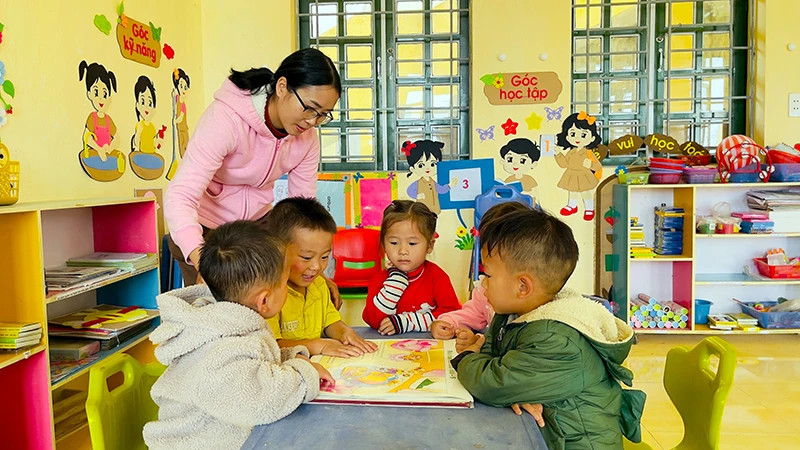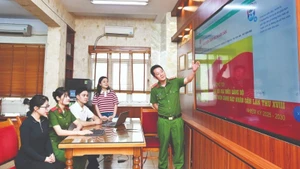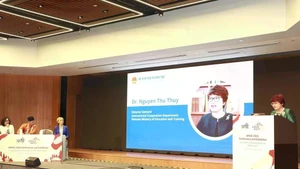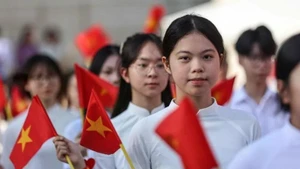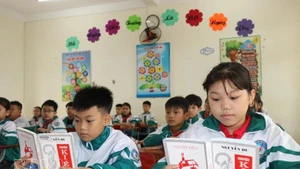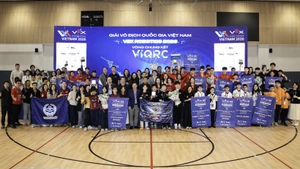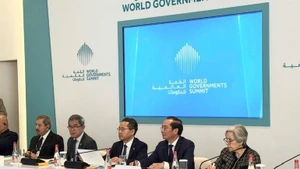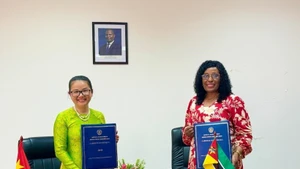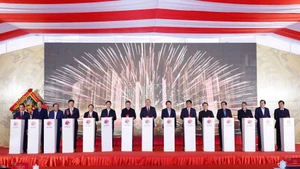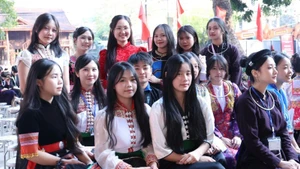In 2024, Typhoon No. 3 (Yagi) hit Vietnam with devastating force, causing severe consequences in many localities. The typhoon struck just before the 2024-2025 school year, leaving many students, families, and schools facing immense difficulties.
In Yen Bai Province, the education sector suffered heavy losses, with two teachers and eight students losing their lives. Additionally, 28 schools were flooded, and 35 experienced landslides, damaging infrastructure, teaching equipment, and students’ textbooks. Tens of thousands of homes were also affected.
In response, Yen Bai implemented a tuition support policy for preschool and high school students to help ease financial burdens on parents and students. For the 2024-2025 school year, more than 73,700 students in Yen Bai benefited from tuition exemptions, totaling over 48 billion VND.
Pham Thi Gioi, a resident of Chau Que Ha Commune, Van Yen District (Yen Bei), shared: “My family relies on farming, and money is always tight. Paying for my two children’s education every year has been a struggle. Every school term, I have to find ways to cover the fees. Now that tuition is waived, I feel a huge sense of relief. This policy is truly meaningful, easing the financial burden for parents and ensuring that children can continue their education.”
According to Dao Anh Tuan, Deputy Director of Yen Bai’s Department of Education and Training, thanks to tuition exemptions, despite existing difficulties, the province has successfully increased preschool enrollment to 97.4% (a 1.7% rise from the previous year). The enrollment rate for five-year-old children reached 99.98% (up 0.02% from the previous year). Additionally, 100% of children in daycare and kindergarten classes now receive full-day schooling, regular health check-ups, and growth monitoring as per regulations.
Notably, Yen Bai has successfully implemented the “Happy School” model in 400 educational institutions, accounting for 88.7% of all schools in the province. Many institutions have adopted innovative and practical approaches, contributing to the well-being of the mountainous communities.
Not only have disaster-affected areas benefited from such policies, but some economically developed localities have also prioritised education by implementing tuition exemption policies. For instance, since 2021, Da Nang has provided citywide tuition waivers, with funding amounting to hundreds of billions of VND.
Nguyen Thi Anh Thi, Vice Chairman of Da Nang’s People’s Committee, emphasised: “Investment in education is always a top priority in our city’s socio-economic development plans. The tuition exemption policy aims to alleviate financial difficulties for families, ensure social equity, promote education in rural and disadvantaged areas, and attract talent and workers.”
According to Le Thi Bich Thuan, Director of Da Nang’s Department of Education and Training, the city has implemented full tuition support for public preschools and high schools for four consecutive years. “This policy has significantly reduced the financial burden on parents, increased student enrollment rates, and minimised dropout rates. It not only provides immediate benefits but also represents a strategic investment in the country’s future, allowing Da Nang’s education sector to develop comprehensively.”
Additionally, Da Nang has made significant investments in educational infrastructure and teaching quality. “As a result, the city’s education system has seen remarkable growth, becoming one of the leading localities in educational quality,” Thuan noted.
According to the Ministry of Education and Training, ten provinces and cities have passed resolutions to waive tuition fees for preschool and high school students for the 2024-2025 school year, including Quang Ninh, Hai Phong, Yen Bai, Vinh Phuc, Quang Nam, Khanh Hoa, Da Nang, Ba Ria-Vung Tau, Binh Duong, and Long An.
The Politburo’s decision to implement nationwide tuition exemptions for public school students from preschool to high school (starting September 2025) will significantly enhance educational quality, gain broad public support, and align with Vietnam’s socialist principles and the government’s commitment to education. This policy also reflects the global trend observed in many developed countries.
Currently, Vietnam has 23.2 million students (excluding those in vocational and continuing education centres). The estimated budget required to implement this tuition-free policy is approximately 30 trillion VND.
Tran Thanh Dam, Director of Financial Planning at the Ministry of Education and Training, stated that in response to the Politburo’s directive, the Ministry will work with local governments and educational institutions to develop specific policies for tuition waivers. The primary goal is to ensure adequate public-school infrastructure, thereby maintaining equal access to education.
For private and non-public educational institutions, the Ministry will also study and propose appropriate regulations regarding tuition fees and financial support to align with legal requirements and practical conditions.
Professor Dinh Quang Bao, former Rector of Hanoi National University of Education, praised the policy, stating: “The Politburo’s decision to waive all tuition fees for public school students nationwide has been widely welcomed by the public. It brings joy to families and strengthens national unity, ensuring that future generations receive the necessary investment to continue our country’s development.”
Globally, many countries, including those with economic difficulties, have adopted tuition-free education policies to ensure equity and develop human resources. Vietnam’s adoption of this policy demonstrates a deep commitment to social welfare and a strategic vision for the nation’s future. It reinforces that lifelong learning is a top priority, paving the way for a more educated and prosperous society.
